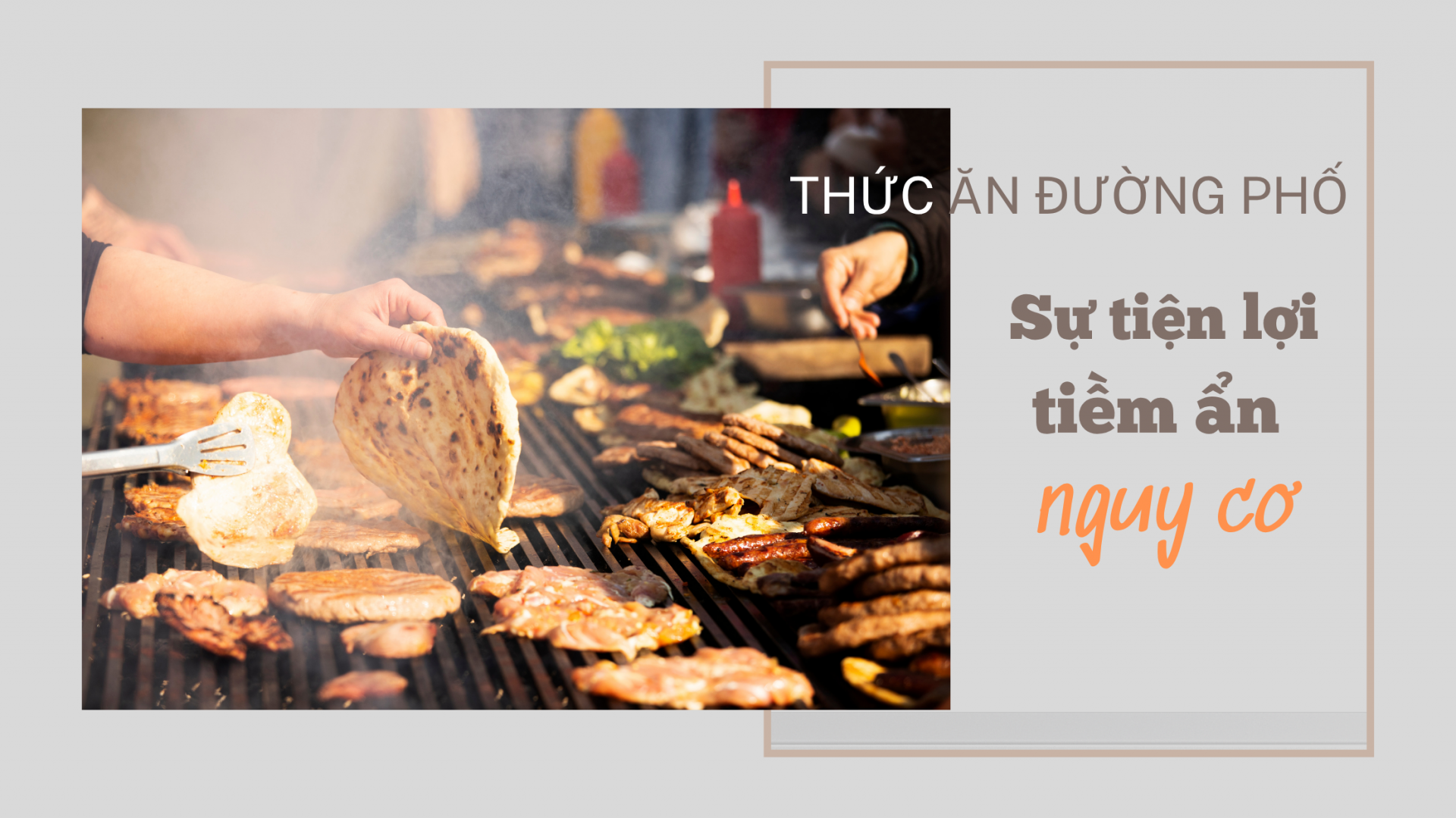Design: YEN LAN |
Street food is becoming more and more popular, especially in areas in front of school gates, where there are many snack shops serving students. However, the issue of food safety for these dishes is becoming a major concern for parents, schools and the whole society.
Snacks such as mixed rice paper, sausages, fried fish balls, soft drinks, milk tea, shaved ice syrup; pre-packaged processed foods such as BBQ steak, mini Tibetan beef, stuffed squid, spicy stir-fried ear cartilage, grilled meat with mushrooms, colorful spicy fish of unknown origin... are very attractive to consumers, especially students, because of their delicious taste, cheap price, and convenience. However, most of these dishes do not meet food safety and hygiene standards. Food is often processed hastily, improperly preserved, ingredients of unknown origin, unsanitary processing tools, and sellers do not wear gloves or masks.
These factors pose a risk of food poisoning, diarrhea, parasitic infections, and even long-term health effects due to the accumulation of toxic chemicals or additives that are not allowed in food.
It is not difficult to see groups of students surrounding carts selling mixed rice paper, fried fish balls, grilled sausages, and "homemade" milk tea in front of the school gate after school.
In industrial parks, workers often eat breakfast and lunch with food sold on the roadside such as vermicelli soup, bread, sticky rice... because it is cheap and convenient. However, hygiene issues are rarely paid attention to.
According to statistics from the Food Safety Department ( Ministry of Health ), every year the country records hundreds of food poisoning cases, many of which originate from unsafe food sold on sidewalks, school gates, and spontaneous markets.
Associate Professor, Dr. Nguyen Thi Lam, former Deputy Director of the National Institute of Nutrition, warned: “Street food is often not properly preserved and is easily contaminated with pathogenic microorganisms such as Salmonella, E.Coli, Staphylococcus aureus... In addition, the risk comes from preservatives, industrial colorants, cooking oil that has been reused many times, and even additives that are not allowed to be used in food.”
One of the concerns is the risk of accumulating toxins in the body due to long-term consumption of foods of unknown origin. These toxins can damage the liver and kidneys, affect the nervous and endocrine systems, and even increase the risk of cancer.
In recent times, localities have launched many campaigns to inspect and handle violations of food safety. However, the management of street food still faces many difficulties due to lack of human resources, lack of legal tools and especially due to the small and mobile nature of this type of business.
Associate Professor Dr. Nguyen Duy Thinh, former lecturer at the Institute of Biotechnology and Food, Hanoi University of Science and Technology, said: “Street food management is a very difficult problem, because the sellers are very diverse, not fixed, most of them are freelance workers with low qualifications. If we only check and punish without combining propaganda and support, it will be difficult to achieve sustainable results.”
Mr. Thinh emphasized: “The key solution is to raise public awareness, especially among students and young consumers. Because they are the main customers of snack and street food stalls. If consumers know how to choose and refuse dirty food, sellers will also be forced to change.”
Food safety is not just the responsibility of one person, but the joint effort of the whole community.
According to Decision 12 of the Provincial People's Committee regulating the assignment and decentralization of state management of food safety in the province, the People's Committees of communes/wards/towns are responsible for implementing state management of food safety in the area for food service establishments with a business scale of less than 50 meals/serving, street food businesses, small-scale food production and trading establishments... MSc. Le Sy Kim, Head of the Food Safety Department (Department of Health ) said that the Department of Health has issued a document directing local health centers to regularly monitor and guide street food vendors to properly implement food safety and hygiene requirements; mainly monitoring and guiding.
To ensure food safety for street food, the Food Safety Department recommends that authorities increase regular and surprise inspections and supervision of mobile food vendors, especially around schools; strictly handle violations of food safety; and at the same time, disseminate knowledge about food safety to vendors. Schools should coordinate with local health departments to organize extracurricular activities, educate students about healthy eating habits, and recognize unsafe food. Parents should guide their children to protect themselves by choosing clean foods with clear origins; and can prepare snacks at home to ensure quality. Finally, vendors must raise their sense of community responsibility, comply with food safety and hygiene regulations, and invest in processing and preservation tools and safe ingredients.
Source: https://baophuyen.vn/xa-hoi/202505/de-thuc-an-duong-pho-khong-con-la-noi-lo-5ab1dcc/




![[Photo] General Secretary attends the parade to celebrate the 80th anniversary of the founding of the Korean Workers' Party](https://vphoto.vietnam.vn/thumb/1200x675/vietnam/resource/IMAGE/2025/10/11/1760150039564_vna-potal-tong-bi-thu-du-le-duyet-binh-ky-niem-80-nam-thanh-lap-dang-lao-dong-trieu-tien-8331994-jpg.webp)
![[Photo] Opening of the World Cultural Festival in Hanoi](https://vphoto.vietnam.vn/thumb/1200x675/vietnam/resource/IMAGE/2025/10/10/1760113426728_ndo_br_lehoi-khaimac-jpg.webp)
![[Photo] Ho Chi Minh City is brilliant with flags and flowers on the eve of the 1st Party Congress, term 2025-2030](https://vphoto.vietnam.vn/thumb/1200x675/vietnam/resource/IMAGE/2025/10/10/1760102923219_ndo_br_thiet-ke-chua-co-ten-43-png.webp)
























![[Photo] Unique Phu Gia horse hat weaving craft](https://vphoto.vietnam.vn/thumb/1200x675/vietnam/resource/IMAGE/2025/10/10/1760084018320_ndo_br_01-jpg.webp)










































































Comment (0)